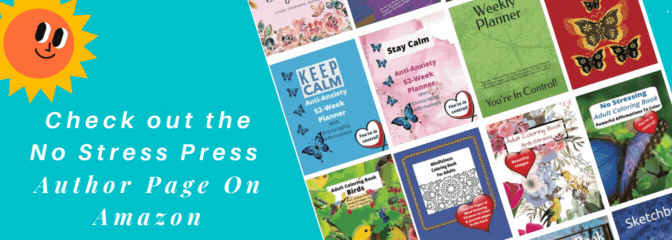Relaxation Techniques That Reduce Stress
We don’t have to let stress dictate who we are or how long we’ll live. We’re dynamic creations with a resilient brain and willpower that can change our lives. In a perfect world, as much as we decide that we want to move in a positive direction, everything that we are moves us into that new place. For some of us, making changes comes with more difficulty than others. It may be because the stakes are perceived to be very high, making it more difficult to believe that we can obtain the object or outcome desired. This causes stress. In fact, some people live under chronic stress. Chronic stress is any uncomfortable “emotional” experience accompanied by predictable biochemical, physiological, and behavioral changes over extended periods of time. The No Stress Press doesn’t want this for any of us, so we encourage practicing relaxation.
Practicing “relaxation” is important to managing stress because when we’re relaxing, blood flow around our bodies increases and gives us more energy. We have a calmer and clearer mind which supports positive thinking, concentration, memory, and decision making. Additionally, relaxation slows our heart rate, lowers our blood pressure, and relieves tension. As an added perk, we’re much better company when we actively practice relaxing.
Get Tips & Ideas
Quarterly Newsletter March, June, September & December
Adult Coloring Is Therapeutic
Relaxation Techniques That Reduce Stress
Many have stated that when they decide to do something different, they feel a sense of desperation to make moves that they aren’t totally certain of. These are the growing pangs of change. It has been noted that there’s much discomfort in change in general, but sometimes, when we want something so badly the stress of not achieving or acquiring the object of desire can be unbearable. So how do we deal with this? No one bit of advice is the universal answer, however the techniques below have helped many find balance.
- Mindfulness meditation is the basic human ability to be fully “in the moment”, aware of where we are and what we’re doing, and not too reactive or inundated by what’s going on around us. Mindfulness is used to wake up to the inner workings of our mental, emotional, and physical processes. Mindfulness is accessible to us in every second (every second is a new beginning), whether through affirming meditations or taking time to pause and breathe when the phone rings or a text message notification pops up instead of rushing to answer it.
- Visualization is when we picture objects, scenes, or events that are associated with relaxation or calmness and attempt to produce a similar feeling in our body. Or we can imagine ourselves already in the completed result that we’re seeking.
- Breathing exercises are quick fixes when we need more instant relief. Why? Because breathing deeply slows down the release of cortisol, a primary stress hormone, which is why there is a link between stress and breathing. Focusing on taking slow, deep breaths—also called diaphragmatic breathing is very helpful in high stress situations and to get us ready for an affirmation/meditation session.
- Adult coloring can produce a meditative state that relieves stress levels. It takes the focus from our situation and allows our creativity to flow. Adult coloring. Especially, mandalas and any pattern that focuses on details engulfs our mind and gives our brain a peaceful break from the negative thought patterns.
- Take supplements and adaptogens to help regulate stress. With everything going on in the world today, there’s no shame in needing a boost to help you get through a particularly stressful event. Vitamin B1 counters cortisol. Vitamin D1 is a powerful antioxidant that helps fight depression because it is an anti-inflammatory that boosts the immune system. Magnesium and Potassium are also important as we get a better handle on stress. Please make certain to seek medical advice from a primary care provider for health issues.
A Special Word About Gratitude
Gratitude lowers stress thereby lowering the levels of cortisol and adrenaline the adrenal glands produce. In a study conducted by Kyeong Sunghyon and associates on the effects of gratitude meditation on heart rate, it was found to lower heart rate.
Writing thoughts of gratitude and appreciation on paper also offered a better mental outcome over an initial 4 weeks and 12 weeks after the study’s conclusion according to the study done by the Joel Wong and associates.
Gratitude increases mental strength. For years, research has shown gratitude not only reduces stress, but it may also play a major role in overcoming trauma. A 2006 study published in Behavior Research and Therapy found that Vietnam War veterans with higher levels of gratitude experienced lower rates of post-traumatic stress disorder. A 2003 study published in the Journal of Personality and Social Psychology found that gratitude was a major contributor to resilience following the terrorist attacks on September 11. Recognizing all that you must be thankful for —even during the worst times—fosters resilience.

Conclusion
When you lower stress, you lower your body’s fight or flight response. That response includes chemicals produced in the adrenal glands called cortisol and adrenaline. These chemicals are short-term responders to environmental stress. If you stay in a stressed state your body becomes desensitized to the effects of the chemicals. Chronic stress makes people more susceptible to illness. Gratitude has been clinically shown to reduce cortisol, thereby reducing inflammation, heart rate and blood pressure.
Remember, no one thing is going to bring wholeness. We must dedicate ourselves to loving ourselves enough to pay attention to how we feel. Then we must make feeling better about ourselves the most important thing we do!
Thank you for reading this post!
Be blessed!



